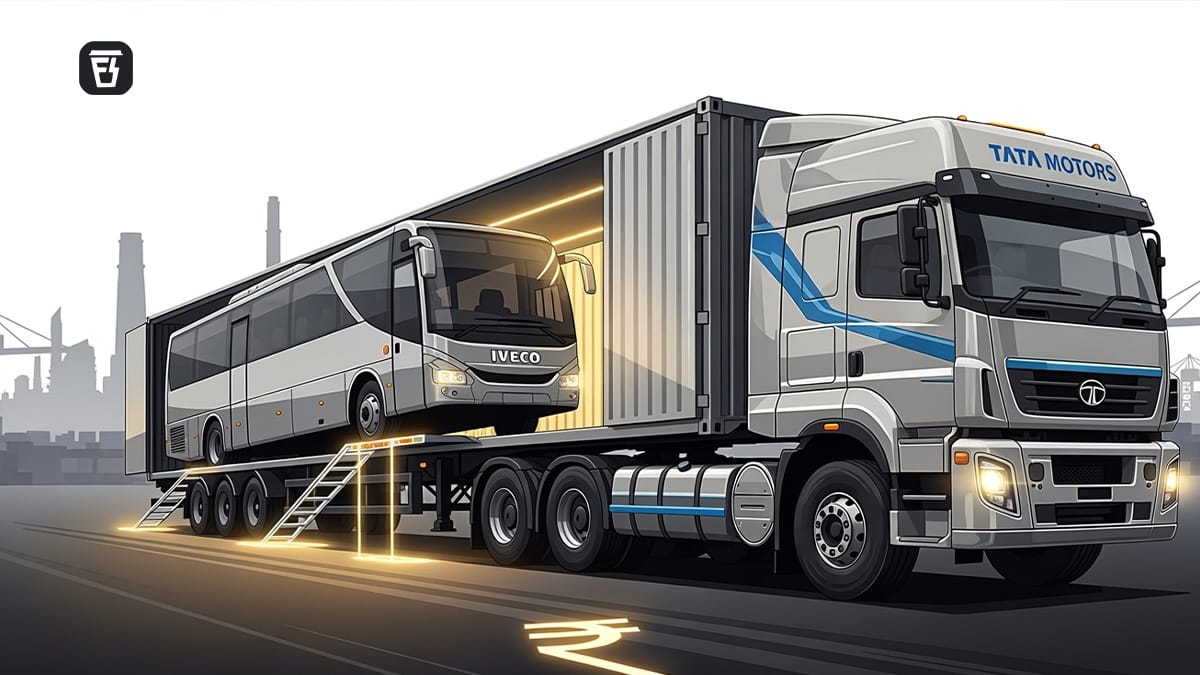Did Tata Motors just bet the house on Iveco?

In today’s Finshots, we look at the biggest deal Tata Motors has ever made — a ₹38,000 crores bet on Italy’s Iveco — and what it means for the company’s future.
The Story
Try putting a fair value on Tata Motors, and you'll quickly see the problem.
You’d probably need more than one analyst to do the job — and even then, the estimates might look wildly different. Because even though it’s just an auto company, Tata Motors is a maze. There’s domestic car passenger vehicles (PV) business, the commercial vehicle (CV) arm, the EV play, Jaguar Land Rover (JLR), and now… Europe’s Iveco: a CV giant that Tata is scooping up for ₹38,000 crores (€3.7 billion). The group’s biggest acquisition ever.
So what’s the deal with Iveco? And why’s Tata doing this now?
Tata Motors is already India’s leader in CV. It commands around 40% market share. In FY25 alone, the CV arm brought in ₹75,000 crores in revenue with healthy operating profit margins of 12%. Globally, it’s the fourth-largest player in trucks.
The only problem is that revenue is tied mostly to India. And India is volatile.
CV sales tend to rise when infrastructure spending rises and collapse when elections or interest rates slow things down. In fact, Tata’s domestic CV volumes fell 5% year-on-year in FY25 to 3.76 lakh units.
Now, let’s for a moment look at Iveco.
It’s got an 11% truck market share across Europe and Latin America. It’s the second-largest bus maker in Europe. Its powertrain business, FPT Industrial, is the fifth-largest engine manufacturer in the world. And there’s Iveco Capital, its financing arm that adds a steady stream of income from dealers and customers.
Most of Iveco’s money — about 75% — comes from Europe. In 2024, it made around ₹90,000 crores (€10 billion) from selling trucks, ₹23,400 crores from buses (€2.6 billion), and ₹31,500 crores (€3.5 billion) from powertrain engines. And the profit margins on each of these were around 5–6%.
Now, put the two companies together, and you’ve got a ₹2.3 lakh crore CV empire that looks a lot to CV players, with 50% of revenue from Europe, 35% from India, and the rest from Latin America and North America.
That kind of footprint instantly gives Tata Motor’s CV arm greater access to developed markets and regulatory muscle.
And that’s what makes this move so interesting.
Because it’s not about margins. In fact, Tata’s CV business is actually more profitable — with a 9% margin compared to Iveco’s 5.8%.
But the deal valuation makes up for it. As a Reuters post puts it… “Its offer values Iveco’s at just over 3 times its forecast operating income for the 2026 fiscal year, about one-third the multiple Motilal Oswal analysts ascribe to the acquirer's CV unit.”
Meaning, Tata Motors is paying just 3 times what Iveco is ‘expected’ to earn in profits (before taxes) in 2026. For context, Tata’s own CV business is valued at nearly 3 times more than that. So, in a way, it’s like buying a similar business at one-third the price.
And it’s an even steeper discount when you look at global peers like Daimler or Volvo, which usually trade at 10–12 times earnings. So if Tata can fix some of the leaks and scale things up, this could turn into a very rewarding deal.
But even beyond numbers, this is a strategic shortcut.
Think about it. If Tata wanted to build all of this from scratch — an electric and hydrogen powertrain setup, a European truck presence, an R&D-rich engine platform like FPT, and a financing business with reach in Europe — it would’ve taken years and billions in R&D, capex and trial-and-error. This deal gets it all in a pre-packaged form (except the defence business of Iveco, which will be spun off before the deal).
It also fits neatly into Tata’s bigger game plan: the long-awaited demerger of its CV and PV businesses. You see, for years, Tata Motors has operated like a holding company, with three semi-autonomous arms: commercial vehicles (CV), passenger vehicles (PV), and Jaguar Land Rover (JLR). But in March 2024, it finally decided to split them formally. Under this plan, the CV business will become its own listed entity, while the PV, EV, and JLR arms will be bundled into another. And this Iveco deal could dramatically reshape how the CV entity is perceived. It could make the standalone CV entity far more attractive when that split eventually happens.
That’s the upside.
The downside? Well, some of these projections are just projections for now. Meaning, they account what the companies will earn in the coming future.
But if you zoom in on today’s numbers, the deal doesn’t come across exactly as cheap. Tata Motors itself mentions that it’s at around 30% premium to Iveco’s average price over the last three months.
Plus, Tata’s taking a ₹38,000 crore bridge loan to fund the buyout, and hopes to repay it over four years using internal cash flows, a potential €1 billion equity raise, and even monetising group stake in Tata Capital.
Will this significantly raise debt? Not dramatically. But it’s still a shift in posture.
Tata Motors had just clawed its way back to near-zero net debt after years of deleveraging. Now, between this deal, JLR’s EV transition, and the new Sanand plant for EVs in India, it’s once again taking on a fair bit of leverage. And if global rates rise or sales disappoint, those repayments could pinch.
There’s also the challenge of execution.
Iveco is an ex-Fiat business, spun off just a few years ago. It’s still finding its rhythm. Europe’s CV market is cooling. FPT is investing heavily in hydrogen and battery tech, but margins are under pressure. And auto M&As are rarely smooth — Tata knows this better than anyone. Its acquisition of Corus Steel was a mess. JLR took over a decade to deliver returns.
So what’s Tata really chasing here?
Not just a brand, footprint, and definitely not a cash cow. Iveco’s margins are thin, the debt is chunky, and growth hasn’t exactly been thrilling. But what Tata seems to be buying here is strategic leverage.
Because the world of commercial vehicles is being rewritten. Electric trucks need new platforms. Hydrogen power needs new infrastructure. And autonomy, telematics, over-the-air updates — all of that calls for companies to move from just assembling machines to building ecosystems. And right now, Tata is strong in India, but largely absent from the global conversation shaping that future.
Iveco gives Tata a shot at staying on the other side of that equation.
But all this comes with a caveat.
Because Tata’s paying a premium for possibility, not performance. Iveco didn’t post cheerful numbers in its recent quarter. FPT’s margins are shrinking. And integration won’t be easy. Especially one with a legacy of government ownership, a unionised workforce, and brand baggage. And also keeping in mind the deal won’t close until early 2026.
But again, the thing is that Tata doesn’t need Iveco to be a blockbuster. It just needs it to be a bridge; a way to fast-track capabilities, cross-pollinate platforms, and future-proof its CV arm before someone else changes the rules entirely.
Will it work?
We don’t know yet. But in a world where truckmakers are racing to reinvent themselves, Tata Motors may have just chosen the one thing that’s harder than building from scratch: rewriting the rules of the game altogether.
Until then…
If this explainer helped you see the Tata-Iveco deal clearer, share it via WhatsApp, LinkedIn, or X and help a friend decode it in under three minutes.
🔊Introducing Pitch Perfect 2025!

If you've been following us for a while, you know our story didn't begin in a corporate boardroom. It started in a college dorm room with 3 broke students who chose to skip placements and chase something bigger.
That something was Finshots.
Today, Finshots reaches over 500,000 readers, and through Ditto, we've empowered 800,000+ Indians to make smarter insurance decisions.
Now, we're looking for the next game-changing idea to back.
Introducing Pitch Perfect 2025 – a flagship startup pitch challenge powered by Zerodha.
So, if you've got a BIG idea that could help Indians get better with money, pitch it to us!
What's at stake:
✅₹10,00,000 in prizes
✅Potential funding from Zerodha Rainmatter
✅All-expenses-paid trip to Bangalore to pitch directly to Nithin Kamath and industry veterans
Ready? 👉Apply Now!
